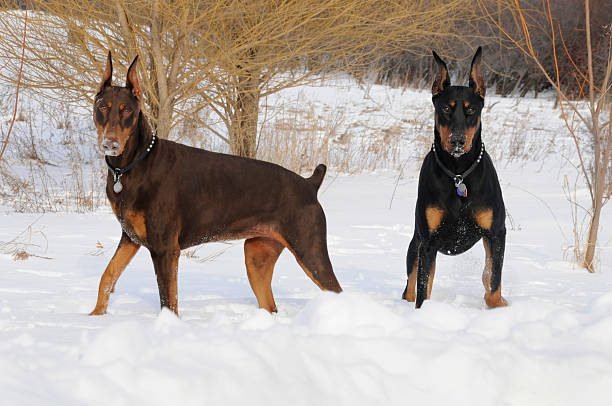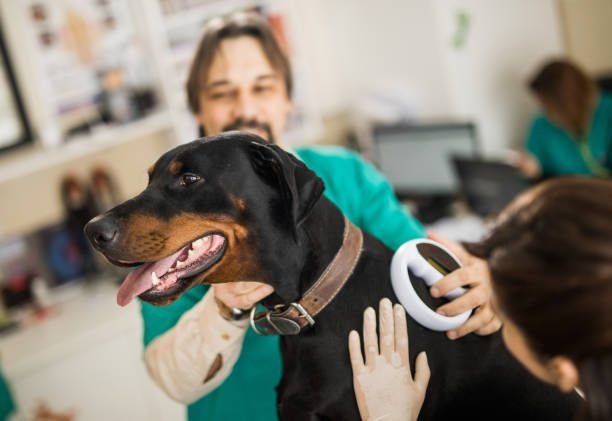In the realm of canine nobility, the Doberman Pinscher stands as a symbol of intelligence, loyalty, and elegance. Known for their sleek appearance and unwavering dedication, Dobermans have earned their place as both guardians and beloved companions. Join us on an enlightening journey as we delve into the rich history, distinctive characteristics, and the myriad reasons why the Doberman Pinscher is not just a dog—it’s a noble and loyal ally.
Doberman Pinscher Dog Breed History
Origins in Germany:
The Doberman Pinscher traces its roots to 19th-century Germany, where a tax collector named Karl Friedrich Louis Dobermann sought to create a versatile and loyal companion for personal protection. By selectively breeding various dog breeds, including Rottweilers, Greyhounds, and Weimaraners, he crafted the prototype of what we now know as the Doberman Pinscher.
Working Roles:
Dobermans quickly gained recognition for their intelligence and versatility. They excelled in various working roles, including guarding, police work, and serving in the military. Their sharp minds and trainable nature made them invaluable partners in numerous capacities.
International Popularity:
The breed’s international popularity soared during the 20th century, and today, the Doberman Pinscher is celebrated as a loyal family companion, a skilled working dog, and a symbol of strength and elegance.
Overview of This Doberman Pinscher Dog Breed
- Group
- Working
- Origin
- Germany
- Size
- Large, sleek, and muscular
- Height & Weight
- 24–28 in (61–71 cm); 70–100 lb (32–45 kg)
- Temperament
- Alert, fearless, intelligent, and loyal
- Lifespan
- 10–13 years
- Exercise Needs
- High — requires daily physical and mental stimulation
- Trainability
- Excellent — obedient, quick to learn commands, and thrives on structure
- Health Issues
- Cardiomyopathy, hip dysplasia, hypothyroidism, and Wobbler syndrome
- Best For
- Experienced owners, families seeking a protective and loyal companion
- Summary
- The Doberman Pinscher is a noble, powerful, and intelligent breed renowned for its loyalty and protective instincts, making it an exceptional guard and family dog.
Identifying Characteristics

Sleek and Athletic Build:
Dobermans boast a sleek and athletic build, combining strength with grace. Their compact bodies and well-defined muscles reflect their agility and capability for various physical activities.
Ears and Tail Cropping:
Traditional Doberman aesthetics include cropped ears and a docked tail. These practices originated for functional reasons but have become a matter of personal preference. However, many countries now discourage or prohibit these procedures.
Distinctive Coat Colors:
Dobermans typically exhibit a short, smooth coat in black and tan, but they can also come in blue and tan, red and tan, or fawn and tan. Their coat colors contribute to their striking appearance.
Behavior and Temperament

Intelligent and Alert:
Dobermans are renowned for their intelligence and alertness. They quickly assess situations, making them excellent guard dogs. Their ability to learn commands swiftly adds to their reputation as trainable companions.
Loyal and Protective:
Loyalty is a hallmark trait of Dobermans. They form strong bonds with their owners and are inherently protective, making them effective guardians for both individuals and families.
Energetic and Playful:
Despite their stoic appearance, Dobermans have a playful and energetic side. Regular exercise and interactive play are essential to channel their energy positively.
Nutrition and Health Considerations
Balanced Diet:
Dobermans benefit from a balanced and high-quality diet. Providing a nutrient-rich diet helps maintain their overall health, ensuring they have the energy and strength they need.
Regular Exercise:
Dobermans have moderate to high exercise needs. Regular walks, play sessions, and engaging activities contribute to their physical well-being and mental stimulation.
Health Screenings:
Regular veterinary check-ups and health screenings are important for Dobermans. They can be prone to certain conditions, including heart issues and hip dysplasia, so early detection is crucial.
Training and Care

Positive Reinforcement Training:
Dobermans respond well to positive reinforcement training. Consistency, patience, and positive reinforcement help cultivate their obedience and good behavior.
Socialization:
Early socialization is vital for Dobermans to ensure they are comfortable around other dogs, pets, and people. Positive exposure contributes to their well-rounded temperament.
Mental Stimulation:
Dobermans thrive on mental stimulation. Providing puzzle toys, interactive games, and challenges keeps their minds sharp and engaged.
Related Articles
- 10 Best Dog Hair Trimmer Grooming Kit for Small Dogs Reviews
- Grain-Inclusive vs. Grain-Free Dog Food: Which Is Better in 2026?
- Top 10 Best Nebulizer Machines for Dogs Reviews
- Human-Grade Dog Food (2026): Benefits, Costs & Top 10 Brands
- Pheromone Diffusers for Dogs
- Puppy Vaccination Schedule (2026): Shots, Timing & Printable Chart
Common Misconceptions Dispelled
Aggressive Stereotype:
One common misconception is that Dobermans are inherently aggressive. In reality, they are loyal and protective, but proper training and socialization can prevent aggressive behavior.
Tail Docking and Ear Cropping:
The perception that tail docking and ear cropping are necessary for Dobermans is a misconception. Many countries discourage or ban these practices, and a Doberman with natural ears and tail is equally prized.
Choosing Doberman Pinscher as Your Companion, Reasons?
Loyal Family Guardian:
Dobermans make exceptional family guardians. Their loyalty, intelligence, and protective instincts contribute to a sense of security within the household.
Versatile Working Partner:
For those seeking a versatile working dog, the Doberman excels in various roles, including police work, search and rescue, and therapy work. Their adaptability makes them valuable partners in different fields.
Elegance and Presence:
The Doberman’s elegant appearance and dignified presence make them stand out. For individuals who appreciate a noble and regal companion, the Doberman Pinscher is a fitting choice.
Frequently Asked Questions (FAQs)
- Are Doberman Pinschers good with children?
- Doberman Pinschers can be excellent family dogs when properly trained and socialized from a young age. Their loyal and protective nature makes them watchful guardians, but supervision is recommended.
- Do Dobermans require a lot of exercise?
- Yes, Doberman Pinschers have moderate to high exercise needs. Daily walks, playtime, and engaging activities are essential to keep them physically and mentally stimulated. Regular exercise contributes to their overall well-being.
- Is tail docking and ear cropping necessary for Dobermans?
- No, tail docking and ear cropping are personal preferences and are not necessary for the well-being of Doberman Pinschers. Many countries discourage or prohibit these procedures, and Dobermans with natural ears and tails are equally cherished.
- Are Dobermans aggressive?
- Doberman Pinschers are not inherently aggressive. With proper training, socialization, and positive reinforcement, they can be loyal, well-behaved companions. Early socialization is crucial to prevent aggressive behavior.
- What is the average lifespan of a Doberman Pinscher?
- The average lifespan of a Doberman Pinscher is around 10 to 13 years. Providing a balanced diet, regular veterinary check-ups, and a healthy lifestyle contribute to their longevity and well-being.
Conclusion: Doberman Pinscher – A Noble Ally
In conclusion, the Doberman Pinscher epitomizes the qualities of a noble and loyal ally. Whether you’re drawn to their intelligence, athleticism, or unwavering loyalty, Dobermans bring a unique blend of strength and grace to the world of canine companionship. If you’re seeking a devoted and versatile partner—a noble ally ready to share your life with loyalty, courage, and companionship—the Doberman Pinscher might be the perfect addition to your home.






